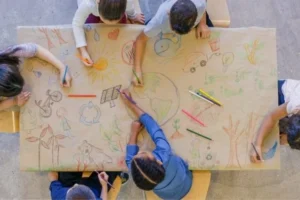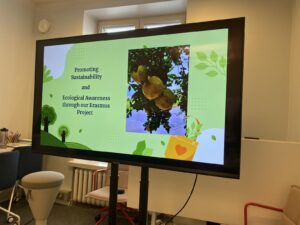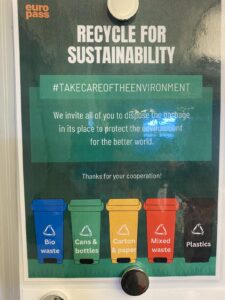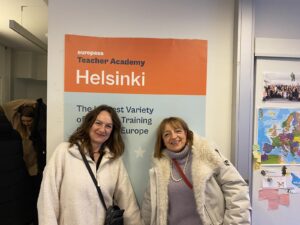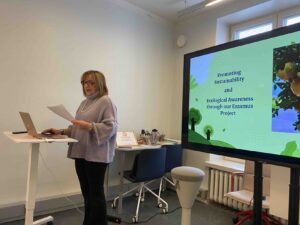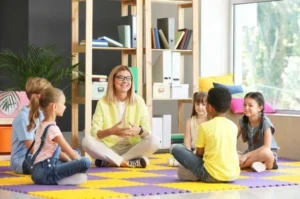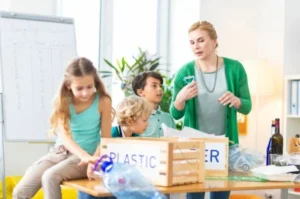OUR SCHOOL
1η ΜΕΤΑΚΙΝΗΣΗ ΣΤΗ ΦΙΝΛΑΝΔΙΑ
ΕΚΠΑΙΔΕΥΤΙΚΟΙ:Σόλτα Ιωάννα, Μωραΐτη Ελένη
Environmental Education in Finland: the Eco-Social Approach
Introducing environmental education in the classroom poses a new challenge to today’s teachers. The subject is complex and the current perspectives aren’t too promising.
Thus, how can we increase students’ knowledge of ecosystems and environmental problems while also promoting hope? How can we encourage active citizenship among students when it comes to sustainable development? How to capture students’ attention and interest with an effective pedagogical method?
This course will help teachers deal with these issues by introducing them to the approach to environmental education adopted in the Finnish education system. The core curriculum for basic education in Finland emphasizes each one’s capacity to contribute to a sustainable future as it is built around four essential elements: participation, systems thinking, sufficiency, and responsibility.
As a participant in the course, you will experience how environmental education can support students’ personal relationships with nature, responsible consumer behavior, and active citizenship. You will discuss how to promote environmental education related to different environments: the forest, the city center, and the classroom.
You will learn new pedagogical methods and relevant theory through workshops, reflective discussions, and short theory input. Almost all methods used are interactive and collaborative. The group is seen as an arena for exchanging perspectives, solving problems, and learning.
By the end of the course, you will know how to implement the Finnish methods of environmental education. You will feel empowered to teach environmental education in your classes once return to your schools.
Learning outcomes
The course will help the participants to:
- Discover the Finnish approach to environmental education;
- Make students reflect on the impact of their actions on environmental sustainability;
- Design and use learning environments that supports curiosity and learning;
- Exploit collaborative methods to teach environmental education;
- Supports hope and active citizenship among the students while teaching environmental education;
- Implement new methods in environmental education in their school.
Tentative schedule
Day 1 – Introduction to the course and to the Finnish eco-social approach
- Introduction to the course, the school, and the external week activities;
- Icebreaker activities;
- Presentations of the participants’ schools;
- An introduction to Finnish environmental education.
Day 2 – How to support the students’ relationship with nature
- Environmental education in the forest;
- Reflective discussions;
- Short theory input on different dimensions of environmental education and on the student’s relationship to nature.
Day 3 – The student as a consumer
- Short introduction to sustainable development and responsible consumer behavior;
- Workshop on responsible consumption;
- Reflective discussion.
Day 4 – The student as an active participant
- A short introduction to Paulo Freire’s theory and to eco-social education;
- An eco-social city walk;
- Reflective discussion.
Day 5 – Planning for implementation
- Plan your road map for introducing new pedagogical methods at your school;
- Presentations;
- Summary of the course.
Day 6 – Course closure and cultural activities
- Course evaluation: round-up of acquired competencies, feedback, and discussion;
- Awarding of the course Certificate of Attendance;
- Excursion and other external cultural activities.
ERASMUS DAYS IN OUR SCHOOL
ΔΕΙΤΕ ΠΑΡΑΚΑΤΩ ΣΧΕΤΙΚΑ ΜΕ ΤΗ ΜΕΤΑΚΙΝΗΣΗ ΣΤΟ ΕΛΣΙΝΙΚΙ
https://elenamoraiti67.blogspot.com/2025/02/erasmus.html
Η εμπειρία μας στο Ελσίνκι
———————————————————————————————————————————————-
2η ΜΕΤΑΚΙΝΗΣΗ ΣΤΗ ΦΛΩΡΕΝΤΙΑ ΤΗΣ ΙΤΑΛΙΑΣ
3-10 ΜΑΡΤΙΟΥ 2025
ΕΚΠΑΙΔΕΥΤΙΚΟΙ:Βεντίστα Μαρία ,Πίκλας Ιωάννης
Project-Based Learning for Primary School
Primary school teachers have a huge responsibility to educate tomorrow’s citizens, but it often feels hard for them to provide children with 360-degree, meaningful learning experiences.
How hard does it sometimes feel to engage pupils in the lessons, to replace shallow learning with a deep understanding of topics and life competencies? If you also cope with similar issues, project-based learning may interest you.
In project-based learning (PBL), pupils develop deep knowledge and skills through engaging learning activities within a student-led, real-world, meaningful context. PBL can be used in any subject, is easily implementable, and does not require teachers to turn their jobs upside down.
During the course, not only will you discover what PBL is through a variety of inspiring examples, but you’ll also find out how your own curriculum topics can be incorporated into PBL.
You’ll learn which tools are best for your primary school students, how to effectively evaluate their learning, and how to be a good mentor in order to promote critical thinking, autonomy, collaboration, and other 21st-century skills. Finally, you’ll have the chance to plan a successful, manageable PBL activity.
By the end of the course, you’ll have realized how PBL can provide you with great solutions to design fruitful learning experiences, and you’ll have gained confidence and enthusiasm that is necessary to exploit the opportunities it offers.
Practical strategies and tools will be available for you to nurture children’s key competencies, and you will be ready to use a working PBL model you’ll have shaped for your own students!
Learning outcomes
The course will help the participants to:
- Understand what PBL really is and how it can be useful for any educator;
- Incorporate primary school curriculum topics into PBL;
- Get hints and tools to motivate students and boost their key competencies;
- Gain insight into a variety of activities that you can use in PBL (and beyond);
- Confidently implement PBL in their classes and/or school communities;
- Assess PBL products confidently;
- Evaluate students’ learning of curriculum topics;
- Create detailed, effective, manageable PBL lesson plans, suitable for primary education.
Tentative schedule
Day 1 – Introduction to the course and to project-based learning
- Introductions to course contents, schools, and the external week activities;
- Icebreaker activities;
- Understanding what project-based learning really is;
- PBL in primary schools;
- Motivation in PBL.
Day 2 – PBL vs other methodologies – 21st-century competencies
- Project-based learning and projects: Any differences?;
- Project, task, inquiry-based learning;
- 21st-century competencies;
- Examples of PBL in primary schools.
Day 3 – Implementing PBL
- PBL: Finding a topic;
- PBL: The structure;
- The driving question;
- Frequently asked questions.
Day 4 – PBL design and assessment
- Creating a detailed PBL lesson plan;
- Kinds of assessment.
Day 5 – Presenting PBL
- Completing and presenting your PBL plan and rubric;
- Brainstorming and discussing school-wide PBL programs.
Day 6 – Course closure and cultural activities
- Course evaluation: round-up of acquired competencies, feedback, and discussion;
- Awarding of the course Certificate of Attendance;
- Excursion and other external cultural activities.
ΦΛΩΡΕΝΤΙΑ ΚΑΙ ΟΙ ΣΠΟΥΔΑΙΟΙ ΑΝΘΡΩΠΟΙ ΠΟΥ ΕΖΗΣΑΝ ΕΚΕΙ
PROJECT BASED LEARNING
3η ΜΕΤΑΚΙΝΗΣΗ ΣΤΗ ΒΑΛΕΝΘΙΑ ΤΗΣ ΙΣΠΑΝΙΑΣ
20-27 ΑΠΡΙΛΙΟΥ 2025
ΕΚΠΑΙΔΕΥΤΙΚΟΙ:Κουκώλη Μαρία, Σιδέρη Μαρίνα,Τζιτζή Θωμαή,
Zero-Waste School
Zero-waste is a new strategy to address environmental leadership toward sustainable solutions. It is a philosophy and approach to living that aims to minimize waste generation and reduce environmental impact.
The excessive generation of waste and the lack of awareness about sustainable practices have become significant issues affecting our planet and future generations. Educational systems are called to take action to face the climate challenge, and schoolteachers and leaders can provide their contribution.
This course will introduce participants to the principles of a zero-waste lifestyle and explain how to plan and introduce effective waste reduction strategies in their schools.
During the course, participants will learn about different forms of waste and waste prevention and identify several strategies they can propose to their learners to reduce waste. Thus, they will discuss food waste at school, and discover how to prevent it with reference to the waste cycle and sorting stations.
Participants will also discover the benefits of managing a school garden in terms of both pedagogical practices and sustainable education. They will learn how to create a virtuous zero-km cycle for food production at their school, and how to transform food waste into fruitful composting activities.
The course will also explore how slow fashion and critical consumption can help reduce environmental pollution. Participants will discover how to evaluate the impact of non-ecological dressing and practice several activities to bring their students’ awareness on the same issue and promote school projects on sustainable fashion.
Finally, participants will investigate the plastic crisis, explore clean-up initiatives, and DIY workshops that can help to recycle plastic waste, and explore sustainable alternatives.
By the end of the course, participants will have a deep understanding of sustainable waste management practices and know how to implement them within their schools.
They will feel more confident in addressing the pressing environmental challenges faced by their schools, and in engaging their community in activities that raise awareness and drive change.
1 η ημέρα: Εισαγωγή στον κύκλο μαθημάτων
Εισαγωγή στον κύκλο μαθημάτων, στο σχολείο και στις εξωτερικές δραστηριότητες
της εβδομάδας. Δραστηριότητες γνωριμίας των συμμετεχόντων. Παρουσιάσεις των
σχολείων των συμμετεχόντων. Ο τρόπος ζωής με μηδενικά απορρίμματα.
Πόσους πλανήτες χρειαζόμαστε; Μηδενικά απορρίμματα: η γέννηση ενός νέου
πολιτισμού. Μηδενικά απορρίμματα και η ιεραρχία των απορριμμάτων.
Δραστηριότητα: Υπολογιστής Οικολογικού Αποτυπώματος.
Δραστηριότητα: Εισαγωγή στο «ημερολόγιο κατανάλωσης μου»
2 η ημέρα: Διαχείριση σκουπιδιών και υπολειμμάτων τροφίμων.
Σταθμοί και πινακίδες ταξινόμησης: αποτελεσματικές ενδείξεις και βέλτιστες
πρακτικές. Δραστηριότητα: Σχεδιάστε το σταθμό με τις πινακίδες σας.
Σπατάλη τροφίμων: αξιολόγηση των επιπτώσεών τους και μετατροπή των σπάταλων
μεσημεριανών σε γεύματα μηδενικών απορριμμάτων. Πώς να διεξάγετε έναν έλεγχο
απορριμμάτων γεύματος. Δραστηριότητα: Η νέα ζωή των σχολικών απορριμμάτων
(καταιγισμός ιδεών).
3 η ημέρα: Κηπουρική με μηδενικά απορρίμματα.
Πώς να δημιουργήσετε και να διαχειριστείτε έναν σχολικό κήπο: καλλιεργήστε τα
λαχανικά και τα φρούτα σας σε μηδέν χιλιόμετρα. Αποφυγή πλαστικών και
φυτοφαρμάκων και μείωση της κατανάλωσης νερού. Κομποστοποίηση με την τάξη.
Υπαίθρια δραστηριότητα: Επισκεφθείτε έναν κοινοτικό κήπο για ένα πρακτικό
εργαστήριο.
4 η ημέρα: Πλαστικά παντού: προκλήσεις και δράση
Η κρίση πλαστικών παγκοσμίως: τι είναι πλαστικό και πώς φτάνει στον ωκεανό.
Απαντώντας στην κρίση πλαστικών: τι λέει η ΕΕ και τι μπορούν να κάνουν τα
σχολεία; Σκεφτόμαστε συστηματικά για την ρύπανση με τα πλαστικά.
Δραστηριότητα: Ο κύκλος ζωής του πλαστικού. Δραστηριότητα: Ακολουθήστε το
μονοπάτι των Friendly Floatees (πλαστικά παπάκια) κι εξερευνήστε τα ρεύματα των
ωκεανών. Δραστηριότητα: Εργαστήριο καθαρισμού απορριμμάτων και Φτιάξτο
μόνος σου (DIY).
5 η ημέρα: ‘Αργή’ μόδα και κριτική κατανάλωση.
Αργή μόδα και ντύσιμο με μηδενικά απορρίμματα. Δραστηριότητες τάξης και
σχολικές συνθετικές εργασίες για βιώσιμη μόδα. Δημιουργία φυσικών προϊόντων
DIY. Δραστηριότητα: Δημιουργήστε το δικό σας πρόγραμμα σπουδών μηδενικών
αποβλήτων (μηνιαίος και εβδομαδιαίος προγραμματισμός).
6 η ημέρα: Κλείσιμο μαθημάτων και πολιτιστικές δραστηριότητες
Αξιολόγηση μαθήματος: ανασκόπηση των αποκτηθεισών ικανοτήτων,
ανατροφοδότηση και συζήτηση. Απονομή Πιστοποιητικού Παρακολούθησης του
μαθήματος. Εκδρομές και άλλες εξωτερικές πολιτιστικές δραστηριότητες.
